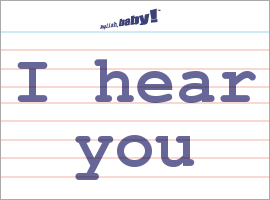| 正面 | 196.hear 英 [hɪə]美 [hɪr]     |
|---|---|
| 背面 |      释义: ear 耳朵——hear听(通过耳朵听)vt. 听到,听;听说;审理vi. 听;听见 例句: 1. "I'm afraid he's ill." — "I'm sorry to hear that."“恐怕他生病了。”——“真是遗憾。” hear 听到,听见来自PIE*kous,听,倾听,来自*ak-ous,*ak,尖的,敏税,词源同acid,acumen,*ous,听,感知,词源同ear,auricle,audit. hearhear: [OE] The prehistoric Germanic verb for ‘hear’ was *khauzjan, which produced German hören, Dutch hooren, Swedish höra, Danish høre, and English hear. Some etymologists have suggested links with Greek akoúein ‘hear’ (source of English acoustic), and also with Latin cavēre ‘beware’ and Russian chuvstvovat’ ‘feel, perceive’, but these have not been conclusively demonstrated.hear (v.)Old English heran (Anglian), (ge)hieran, hyran (West Saxon) "to hear, perceive by the ear, listen (to), obey, follow; accede to, grant; judge," from Proto-Germanic *hauzjan (cognates: Old Norse heyra, Old Frisian hora, Dutch horen, German hören, Gothic hausjan), from PIE *kous- "to hear" (see acoustic). The shift from *-z- to -r- is a regular feature in some Germanic languages. For the vowels, see head (n.); spelling distinction between hear and here developed 1200-1550. Meaning "be told, learn by report" is from early 14c. Old English also had the excellent adjective hiersum "ready to hear, obedient," literally "hear-some" with suffix from handsome, etc. Hear, hear! (1680s) originally was imperative, an exclamation to call attention to a speaker's words ("hear him!"); now a general cheer of approval. To not hear of "have nothing to do with" is from 1754." |